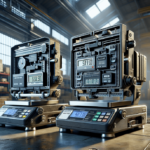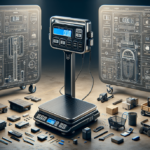PEC Scales vs Salter Brecknell PS1000: Comprehensive SEO-Optimized Comparison
When selecting a reliable and precise scale for your business, PEC scales and Salter Brecknell PS1000 scales emerge as top contenders. Both offer distinct features, benefits, and limitations. This in-depth comparison examines various aspects of PEC scales and Salter Brecknell PS1000 scales to help you determine which best aligns with your business requirements.
Overview of PEC Scales and Salter Brecknell PS1000
PEC scales are celebrated for their affordability, quality, and dependability across multiple industries. Manufactured by Precision Electronic Scale Company, PEC scales come in diverse weighing capacities and sizes, making them adaptable for various applications. Featuring user-friendly interfaces and the latest technology, PEC scales deliver consistent and reliable measurements.
On the other hand, Salter Brecknell PS1000 scales are renowned for their reliability and durability, catering to businesses that require efficient and robust weighing solutions. With decades of experience in the weighing industry, Salter Brecknell produces high-quality equipment. The PS1000 model is built from premium materials with a sturdy design capable of withstanding daily use and challenging environments. Additionally, these scales offer customization options tailored to specific weighing needs.
Both PEC scales and Salter Brecknell PS1000 scales provide high precision, offering accurate readings up to the nearest decimal point. This accuracy is crucial in sectors like food processing, pharmaceuticals, and manufacturing, where precise measurements are essential. Furthermore, both scale types are easy to maintain, requiring minimal calibration, thereby saving time and reducing operational costs.
PEC Scales: Features, Benefits, and Drawbacks
Key Features of PEC Scales
- High accuracy with an error margin of ±0.02%
- Large LCD displays for enhanced visibility
- Automatic zero tracking to ensure consistent measurements
- Simple calibration settings for ease of use
- RS-232 interface for connectivity with computers or printers
Benefits of PEC Scales
- Cost-effective compared to many competitors
- Durable construction with shock-resistant components
- Intuitive controls and user-friendly interface
Drawbacks of PEC Scales
- Limited connectivity options beyond RS-232
- No automatic shut-off feature
- Calibration process can be time-consuming
Despite some limitations, PEC scales remain a popular choice for businesses due to their reliability and affordability. They are widely used in industries such as food service, manufacturing, and logistics.
Salter Brecknell PS1000: Features, Benefits, and Drawbacks
Key Features of Salter Brecknell PS1000
- Highly accurate with an error margin of ±0.02%
- Robust construction using high-quality materials
- Customization settings tailored to specific business needs
- Advanced connectivity options including USB and Ethernet
- Energy-efficient auto-off feature
Benefits of Salter Brecknell PS1000
- Exceptional durability for heavy-duty use
- Advanced features and extensive customization options
- Enhanced connectivity beyond RS-232
- Energy-saving auto-off functionality
Drawbacks of Salter Brecknell PS1000
- Higher price point compared to other brands
- More complex calibration process
- Maximum weight capacity limited to 1000 pounds
Salter Brecknell PS1000 scales are versatile, capable of handling a wide range of weights from small items to bulkier products, making them ideal for businesses with diverse weighing needs. However, businesses requiring to weigh items exceeding 1000 pounds may need to consider alternative scales.
PEC Scales vs Salter Brecknell PS1000: Key Comparison Factors
When evaluating PEC scales against Salter Brecknell PS1000 scales, several critical factors should be considered:
- Price
- Accuracy
- Connectivity options
- Customization settings
- Durability
- Customer support and warranty
Price: PEC scales are more affordable, offering a budget-friendly solution for businesses. In contrast, Salter Brecknell PS1000 scales command a higher price but provide advanced features and greater durability.
Accuracy: Both scales offer high precision with an error margin of ±0.02%, suitable for industries requiring exact measurements.
Connectivity: While PEC scales are limited to RS-232 connectivity, Salter Brecknell PS1000 scales offer advanced options like USB and Ethernet, facilitating better integration with modern systems.
Customization: Salter Brecknell PS1000 scales provide extensive customization options, allowing businesses to tailor the scales to their specific needs, whereas PEC scales offer more basic settings.
Durability: Salter Brecknell scales are built for industrial environments, ensuring long-term durability under heavy use. PEC scales are sturdy but may not match the ruggedness of Salter Brecknell in extreme conditions.
Customer Support: Salter Brecknell is known for excellent customer service and offers longer warranty periods, providing added value for long-term investments. PEC scales may have more limited support options.
Factors to Consider When Choosing Between PEC Scales and Salter Brecknell PS1000
Before making a decision between PEC scales and Salter Brecknell PS1000 scales, assess the following factors:
- Your specific business needs and weighing requirements
- Your budget and available funds
- Frequency of scale usage
- Number of users
- User-friendliness of the controls
- The ease of performing calibrations
- Required level of accuracy
For example, PEC scales are highly accurate and suitable for industries like pharmaceuticals and jewelry, where precision is paramount. In contrast, Salter Brecknell PS1000 scales are better suited for general weighing needs in sectors like manufacturing and logistics, where durability and advanced features are more critical.
Conclusion: Selecting the Right Scale for Your Business
Choosing between PEC scales and Salter Brecknell PS1000 scales depends on your business’s unique requirements and weighing needs. PEC scales offer a cost-effective solution with user-friendly controls, making them ideal for businesses on a budget. Conversely, Salter Brecknell PS1000 scales provide advanced features, superior durability, and enhanced accuracy, making them a worthwhile investment for businesses that demand robust and precise weighing solutions.
Consider your budget, operational needs, and the factors discussed—such as support and maintenance—to make an informed decision. For businesses frequently weighing heavy items, Salter Brecknell PS1000 scales may be the preferable choice due to their higher weight capacity and durable build.
Consulting with a weighing equipment specialist can also provide valuable insights to determine which scale best fits your specific requirements.






















